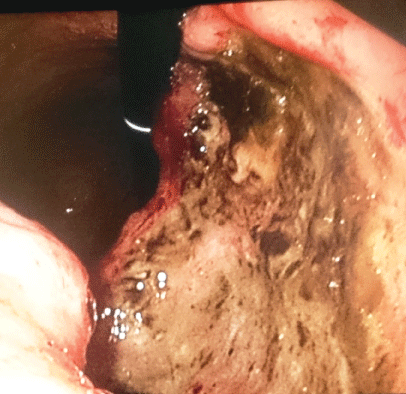Gastrointestinal bleeding revealed an underlying gastric cancer in an 80-year-old patient.
An 80-year-old man who presented with complaints of melena twice or thrice a day for the past 20 days was admitted to the hospital for further investigations. The patient was hemodynamically stable when he presented with hemoglobin levels of 10g/dL (normal levels are between 13 to 18).
History:
History revealed that the patient is a known case of Parkinson’s disease and dementia. He also had a history of weight loss of 10 kgs over the past 3 months, accompanied by fatigue. Family history was insignificant.
Medications:
The patient denied the use of any medications, including analgesics. The only medications he used to take were the prescribed drugs for dementia and Parkinson’s disease. The patient denied smoking and alcohol intake.
Investigations:
A complete blood count revealed values suggestive of iron-deficiency anemia. Upper gastrointestinal endoscopy revealed a sizable ulcerative lesion in the second half of the body of the stomach along the lesser curve, just above the gastric angle. The lesion had irregular margins, and a black-yellowish coating covered it. No active bleeding was observed on endoscopy. The rest of the gastrointestinal tract was unremarkable on GI endoscopy.
Samples were taken during the endoscopy for biopsy, but due to the hard consistency of the ulcerative margins of the lesion, the sample collection was quite difficult.
Diagnosis:
The histopathological evaluation of the biopsy samples revealed a high-grade gastric adenocarcinoma.
Around 2-3% of the patients with severe upper gastrointestinal bleeding have underlying gastric cancer. Such patients usually have a poor prognosis as bleeding occurs secondary to mucosal erosion or when an underlying vessel has been eroded.
In patients with acute upper gastrointestinal bleeding, resuscitation should be initiated, and the patient should be closely monitored. Endoscopy remains indispensable. It is essential for early diagnosis and treatment.
Endoscopic treatment options for control of bleeding from upper gastrointestinal tumors include injection therapy, thermal contact probes, hemospay, and laser therapy. Recurrence is quite common with these procedures. The last report is surgical resection.
Old age patients who present with upper GI bleeding should always be considered for gastric malignancy.
References:
Galanopoulos M, Papaefthymiou A (2016) An Uncommon Cause of Upper Gastrointestinal Bleeding. Clin Med Img Lib 2:023. doi.org/10.23937/2474-3682/1510023
Kim YI, Choi IJ (2015) Endoscopic management of tumor bleeding from inoperable gastric cancer.Clin Endosc 48: 121-127.
Savides TJ, Jensen DM, Cohen J, Randall GM, Kovacs TO, et al. (1996) Severe upper gastrointestinal tumor bleeding: endoscopic findings, treatment, and outcome. Endoscopy 28: 244-248




